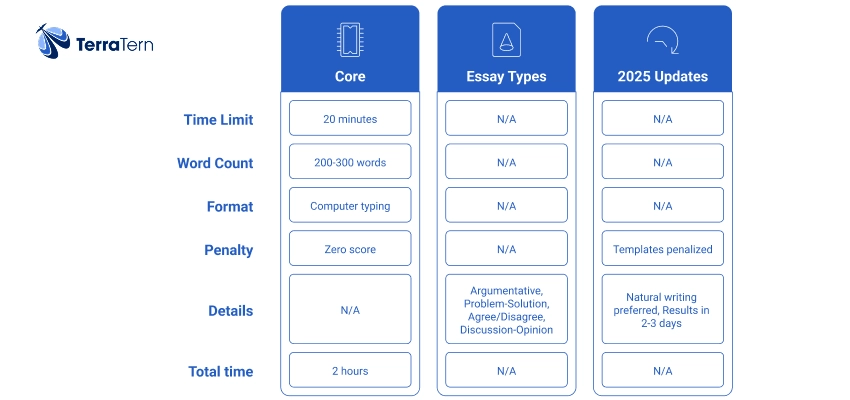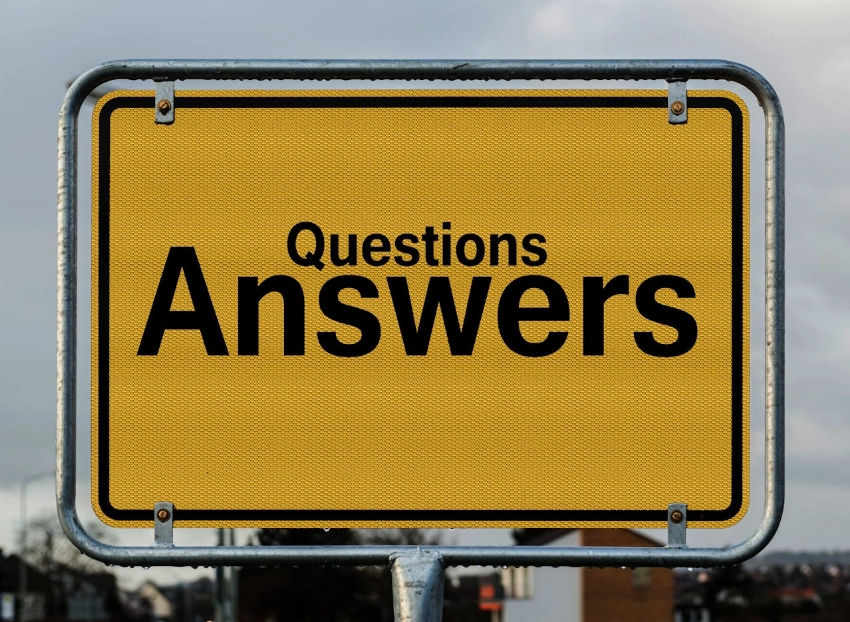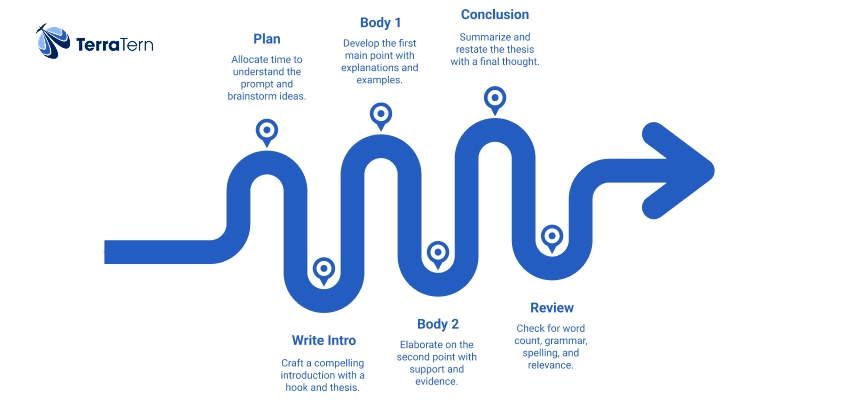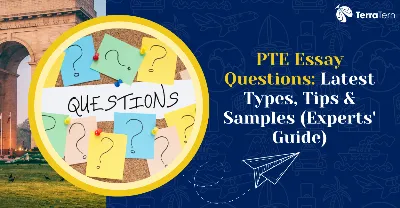Key Highlights
- Types of PTE Essay Questions & Sample Prompts
- Latest Sample PTE Essay Questions in 2025
- Understanding the PTE Essay Writing Section: Latest Guide 2025
- What Is the PTE Essay Task?
- Latest Scoring Criteria for the PTE Essay in 2025
- Latest Effective Strategies for PTE Essay Writing in 2025
- Frequently Asked PTE Essay Topics for Practice in 2025
- Common Mistakes to Avoid in PTE Essay Writing in 2025
- Latest PTE Sample Essay Questions in 2025
- PTE Essay Latest Updates & Facts
- Conclusion
Major update: In 2025, the format of the PTE Academic examination was changed considerably, which had a significant impact on the presentation and scoring of PTE essay questions. Knowing how to score high is more a matter of clarity and argumentation in point than generic templates: read on to learn the latest! The essay now has 200-300 words, 20 minutes writing time and is based on argument organisation and words.
The progressive scoring systems based on AI prefer the use of meaningful and natural sentences instead of strict format templates. Essay prompts often address such spheres as technology, education, environment, and social issues and are discussed regularly. Pearson shortened the duration of the whole test to 2 hours; thus, paying extra attention to writing activities was even more essential. The results are already available within 23 business days, a record speed among English exams.
The new scoring algorithm now penalises overused essay templates and keyword-dumping. The major problem that most candidates face is sticking to the number of words and covering the essay prompt thoroughly, which reduces the writing scores. As one of the tips, teachers advise practising with sample and high-frequency PTE essay questions to enhance familiarity and confidence.
They mostly make errors in grammar, structure, and individual vague thesis statements, as well as answering all the PTE sample essay questions sections in the essay.
Types of PTE Essay Questions & Sample Prompts

To be excellent in the PTE essay, you need to be aware of the different kinds of prompts that you may experience. In this section, the significant essay prompts are described and the most relevant examples the candidates can encounter in 2025 to plan the work on each type of PTE essay question individually.
-
Questions of an Argumentative Essay
These are the PTE essay questions when you have to make a concrete stand on whether you are with or against something and have to prove the same through logical arguments, and may have to make the reader understand what you are offering.
Explanation: A statement or an issue will be presented to you, and the task is to select which side you can take (whether it is agreeing, disagreeing, or somewhere in between) and develop a strong argument in support of this decision. Just saying what your opinion is is not enough: there should be good logic and evidence with it.
Sample Prompts:
-
Others hold that stringent laws are the best approach in dealing with environmental pollution. How far do you agree or disagree with this statement?"
-
Traditional libraries are unnecessary because of the Internet. Do you concur or not?"
-
Is it a fact that all students should be given free education in the university, irrespective of their financial status?
-
Problem-Solution Essay Questions
The candidates are given a problem of a specific nature, and they are supposed to talk about the reasons and causes of such a problem and provide solutions that are rational and practical.
Explanation: These essays usually entail raising the cause of a certain issue and then coming up with solutions that can be taken to address the problem. You should show the ability to be analytical in determining the aspects of the problem and inventive in outlining the effective solutions.
Sample Prompts:
-
Traffic congestion in cities around the globe is getting worse. How does this problem usually occur, and what are the possible solutions that the governors and a person can take?"
-
Face-to-face communication is reduced due to the wide usage of social media. Why is this trend happening, and how might it be made more encouraging as far as direct interaction is concerned?"
-
Most of the developing nations are faced with low accessibility to quality education. Write about the problems and give some of the recommendations on how to increase educational prospects in these areas."
-
Agree-Disagree Essays
These essays expressly require you to either declare your agreement or disagreement with the given statement and then support your argument.
Explanation: Like argumentative essays, only frequently being more explicit in their suggestion, one should choose a position to take. You should introduce your selected position as explicitly as you can, and then you must devote the body paragraphs to proving your position with facts and explanations.
Sample Prompts:
-
It is only parents who should be answerable for the behaviour of their children. Do you disagree or agree?
-
Man has been programmed to become more lazy because of technology. Do you follow or not follow this term?"
-
The knowledge and the capabilities of a student can be best evaluated through formal examinations. Do you disagree or agree?
-
Discussion and Opinion Essays
These usually encourage the test-takers to argue the two aspects of a debate and give a conclusion on their stand.
Explanation: These are unlike direct agree/disagree PTE essay questions as they force a balanced discussion of the opposing opinions to be presented, and then you can add your well-thought-out opinion. You have to demonstrate that you are aware of the complications of the matter by looking into diverse angles.
Sample Prompts:
-
Some say that animal testing is inhumane and ought to be discontinued, whilst others have expressed the need to conduct animal testing to advance scientific growth. Write about the two positions and state your own views.
-
Internet-based learning is very flexible, yet traditional learning in classrooms is more structured. Tell me about the pros of each method and which, in your opinion, is more helpful than the other."
-
But there is the danger of displacement of jobs as the growing use of artificial intelligence takes place. Outline some of the possible advantages and disadvantages of AI in the workplace and express your opinion in your own words."
Latest Sample PTE Essay Questions in 2025

Familiarity with various prompts is crucial for success. Here is a collection of recently repeated and high-frequency PTE essay questions prompts with recommended approaches, helping you anticipate potential topics.
Explanation: Practising with real or highly similar prompts will help you develop quick planning strategies and a versatile vocabulary. The following examples represent common themes in the PTE Academic exam.
Examples:
-
Education: "With the rise of online resources, is the role of traditional teachers becoming obsolete? Discuss."
Approach: Consider the evolving role of teachers as facilitators and mentors, rather than just knowledge providers. Acknowledge the benefits of online resources while emphasising the unique value of human interaction in learning.
-
Technology: "Artificial Intelligence is rapidly changing our lives. Discuss the ethical implications of advanced AI development."
Approach: Focus on issues like data privacy, job displacement, bias in algorithms, and the potential for misuse.
-
Environment: "The responsibility for environmental protection rests primarily with governments, not individuals. To what extent do you agree?"
Approach: Explore the roles of both government policy and individual actions, acknowledging the interconnectedness.
-
Society: "Globalisation leads to the loss of unique cultural identities. Discuss this statement and give your opinion."
Approach: Examine how globalisation can both homogenise and diversify cultures, considering both positive and negative impacts.
-
Health: "Should governments prioritise funding for preventative healthcare over treating existing illnesses? Discuss."
Approach: Weigh the long-term benefits of preventative care against the immediate need for curative treatments.
Did you know? As recently as 2025, the format of the PTE Academic test was significantly revised on the issue of presenting and grading PTE essay questions. High scores are a lot less about templates and templates and much more about clarity and logic; read on to learn the new!
Also Read: PTE and IELTS Score: Comparison & Conversion Guide
Understanding the PTE Essay Writing Section: Latest Guide 2025
The PTE essay writing section is a key element of the PTE Academic exam that enables the analysis of your skills in explaining technically sophisticated ideas clearly, logically and coherently in written English. In this part, the essay writing element has been presented; the most important changes, fundamental requirements, and how the PTE evaluates your writing ability have been described.
What Is the PTE Essay Task?
In the essay task, candidates are asked to show their capability in written English by creating a logical and well-justified essay. PTE test takers are asked to write a 200-300-word essay by responding to an expert prompt in 20 minutes. The topic can be argumentative, problematic, a discussion or an opinion topic.
Points that played a key role during the performance of the task:
-
Time Allowed: 20 min (10min planning/review).
-
Word Count: 200- 300 words. Essays that lie beyond this range (e.g. fewer than 120 words or above 380 words) will be given a score of zero on the criterion of Form, which could push the overall score by a lot.
-
Prompt Variety: As mentione,d there are varieties of prompts which may be argumentative, problem-solution, agree-disagree or discussion and opinion prompts.
-
Computer-Based: You will write your essay with the help of your keyboard. The speed and understanding of typing are hence significant.
Latest Scoring Criteria for the PTE Essay in 2025

Learning scoring values is the key to better results in your essay. Grading of essays is based on content, structure, grammar, vocabulary and coherence. The 2025 revised version focuses on the direct response to the prompt and on the diversified, natural language.
Updated Detailed Scoring Breakdown (As Per PTE Academic Guidelines)
Here is a breakdown of the scoring in regards to PTE essay questions:
|
Criteria |
Max Score |
Description |
|
Content |
3 |
Addresses the prompt fully and provides relevant, well-developed, and appropriately supported ideas. The essay must be on topic. |
|
Formal Requirements |
2 |
Adherence to the word limit (200-300 words). Proper paragraphing (introduction, body, conclusion). |
|
Development, Structure, Coherence |
2 |
Ideas are logically organised, and the essay flows smoothly. Effective use of cohesive devices (linking words, transitional phrases) to connect ideas within and between paragraphs. |
|
Grammar |
2 |
Accuracy in grammatical structures, including sentence construction, verb tense, subject-verb agreement, and punctuation. Minimal errors that do not impede understanding. |
|
General Linguistic Range |
2 |
Demonstrates a range of grammatical structures and sentence types (simple, compound, complex). Avoids repetitive sentence patterns. |
|
Vocabulary Range |
2 |
Uses a wide and appropriate range of vocabulary. Words are used accurately, and there is evidence of academic and topic-specific lexis where relevant. Avoids over-reliance on basic vocabulary. |
|
Spelling |
2 |
Correct spelling throughout the essay. Consistency in using either British or American English spelling conventions. |
Tip on 2025 Scoring Focus: The new AI-based models will intentionally address superficial narrative that starts with a substantial pre-memorised template with little to no consideration of the subtleties of the prompt. This implies that satisfactorily stating keywords in a template will not ensure good marks. Rather, the AI emphasises:
-
Direct Prompt Address: The essay should be able to respond to every portion of the question in a very clear and explicit manner.
-
Natural Language: Do not use robotic, too formal or unnatural sentences. Write straight, simple, and natural English.
-
Significant Cohesion: Words used should create meaningful cohesion rather than just placing them to fill the gaps.
Also Read: IELTS and PTE: Key Differences, Tips & New Updates
Latest Effective Strategies for PTE Essay Writing in 2025

Success in the PTE essay section hinges on not just your English proficiency but also your ability to strategise and manage your time effectively under exam conditions. This section covers best practices and actionable tips to quickly plan, structure, and review your essay.
-
Planning Your Essay
Effective planning is the backbone of a high-scoring PTE essay questions. It prevents rambling, ensures coherence, and helps you stay within the word limit. Plan your response by identifying the PTE writing essay questions type, clarifying your stance, and sketching the outline in the first 2 minutes.
Steps for Effective Planning
Here are the steps for effective planning for PTE essay questions:
-
Understand the Prompt (1 minute):
-
Read the question carefully. Identify keywords and phrases.
-
Determine the essay type: Is it argumentative, problem-solution, agree/disagree, or discussion/opinion?
-
Identify all parts of the question. Ensure you address every component.
-
Brainstorm Ideas (0.5 minutes):
-
Jot down initial ideas related to the prompt.
-
For argumentative essays, think of points supporting both sides before choosing your stance.
-
For problem-solving, brainstorm causes and potential solutions.
-
Formulate Your Thesis Statement (0.5 minutes):
-
Develop a clear, concise thesis statement that directly answers the prompt and outlines your main argument or position. This should be a single sentence, usually at the end of your introduction.
-
Outline Your Essay (1 minute):
Create a brief outline like the one broken down below -
-
Introduction: Hook, background, thesis statement.
-
Body Paragraph 1: Main idea 1, supporting examples/explanation.
-
Body Paragraph 2: Main idea 2, supporting examples/explanation.
-
(Optional) Body Paragraph 3: Main idea 3, supporting examples/explanation (if time and word count permit).
-
Conclusion: Restate thesis (in different words), summarise main points, and conclude with a thought.
Time Management Tip: Stick to the 2-minute planning rule rigorously. Over-planning can eat into your writing time.
2. Writing & Reviewing
Once your plan is solid, it's time to write. Build clear paragraphs, avoid repetition, and reserve time for a quick review to catch errors and improve word choice for PTE writing essay questions.
Writing Phase (15 minutes)
Let’s understand the writing phase for PTE writing essay questions:
1. Introduction (30-45 words):
- Start with a general statement about the topic.
- Paraphrase the PTE essay question prompt.
- Clearly state your thesis statement, outlining the main points you will discuss.
2. Body Paragraphs (140-200 words total):
- Each body paragraph should focus on a single main idea, introduced by a clear topic sentence.
- Provide explanations, examples, or evidence to support your topic sentence. Examples can be general knowledge, logical deductions, or hypothetical scenarios; personal anecdotes are generally discouraged in academic essays.
- Use transition words and phrases (e.g., "Furthermore," "Moreover," "However," "In contrast," "Consequently," "Therefore") to ensure smooth flow between sentences and paragraphs.
- Aim for 2-3 body paragraphs, each around 70-100 words.
3. Conclusion (30-45 words):
- Restate your thesis statement in different words.
- Summarise the main arguments presented in the body paragraphs.
- Provide a final thought or a broader implication of your discussion.

Reviewing Phase (3 minutes)
Let’s understand the reviewing phase for PTE essay questions:
1. Word Count Check: Ensure your PTE essay questions is between 200-300 words. Adjust by adding a sentence or two if too short, or by condensing ideas if too long.
2. Content Relevance: Does your essay directly answer the PTE essay questions? Have you addressed all parts of the question?
3. Grammar and Spelling: Scan for common errors:
- Subject-verb agreement
- Verb tenses
- Punctuation (commas, periods, apostrophes)
- Spelling mistakes (use the spell check feature if available, but manual review is critical)
4. Clarity and Cohesion:
- Do sentences flow logically?
- Are paragraphs well-connected?
- Is the language clear and concise?
5. Vocabulary: Check for word repetition. Can you use a synonym to enhance lexical range without sacrificing clarity? Ensure words are used accurately in context.
Frequently Asked PTE Essay Topics for Practice in 2025

Consistent practice with relevant PTE essay questions is indispensable for building confidence and improving your writing skills. This section provides a curated list of trending and most-repeated PTE essay questions from recent tests and official resources, ensuring your preparation is aligned with current exam trends.
-
Education
Questions within this category often revolve around the evolution of learning, teaching methodologies, and the impact of technology on educational systems.
Explanation: These prompts assess your ability to discuss modern educational challenges and opportunities.
Sample Prompts:
-
"With the increasing availability of online courses, will traditional universities become obsolete in the future?"
-
"Should schools focus more on practical skills and vocational training rather than purely academic subjects?"
-
"The role of teachers has shifted significantly due to technology. Discuss the new responsibilities and challenges teachers face in the 21st century."
-
"Is it beneficial for children to start formal education at a very young age, or should they have more time for play-based learning?"
-
Technology
Given the rapid advancements, technology remains a high-frequency topic. PTE essay questions often explore its impact on society, communication, privacy, and employment.
Explanation: These prompts require you to analyse the multifaceted influence of technological advancements.
Sample Prompts:
-
"The rise of artificial intelligence poses a threat to human employment across various sectors. Discuss the potential consequences and suggest ways to mitigate them."
-
"Social media platforms have revolutionised communication. Analyse their positive and negative impacts on individuals and society."
-
"In the digital age, is privacy still a realistic concept? Discuss the challenges of maintaining privacy online."
-
"Has technology made us more connected or more isolated? Discuss both sides of the argument."
-
Environment & Society
These categories encompass broad global issues that demand critical thinking and awareness. Topics include climate change, urbanisation, social inequality, and cultural shifts.
Explanation: These prompts test your ability to discuss complex societal and environmental challenges, often requiring you to propose solutions or weigh different perspectives.
Sample Prompts:
-
"Climate change is a global crisis. Who should bear the primary responsibility for addressing it: individual citizens, national governments, or international organisations?"
-
"Rapid urbanisation leads to various social and environmental problems. Discuss these problems and propose solutions for sustainable urban development."
-
"Income inequality is a growing concern worldwide. What are the causes of this disparity, and what measures can be taken to promote a more equitable society?"
-
"To what extent does consumerism contribute to environmental degradation, and what steps can individuals take to live more sustainably?"
Common Mistakes to Avoid in PTE Essay Writing in 2025
Identifying and rectifying common pitfalls is essential for improving your PTE essay score. This section outlines the top errors that reduce PTE essay scores, such as exceeding the word limit, weak conclusions, and misunderstanding prompts.
-
Misunderstanding the Prompt: This is perhaps the most critical mistake. If you write off-topic, your content score will be severely penalised, potentially resulting in a zero for the 'Content' criterion. Always take time to analyse the question thoroughly.
-
Exceeding or Falling Short of Word Limit: Writing less than 200 words or more than 300 words will lead to a deduction in the 'Formal Requirements' score, and if the deviation is significant (e.g., below 120 or above 380), it can result in a zero for the entire PTE essay questions.
-
Poor Essay Structure: Lack of a clear introduction, body paragraphs with distinct ideas, and a well-defined conclusion makes your essay disorganised and difficult to follow.
-
Vague or Missing Thesis Statement: Your essay's central argument must be explicitly stated in the introduction. Without it, the essay lacks direction and clarity.
-
Lack of Development/Support: Merely stating points without adequate explanation, examples, or elaboration will result in a low 'Content' score. Ensure each idea is sufficiently developed.
-
Repetition of Ideas: Repeating the same idea in different words throughout the essay not only wastes words but also indicates a limited range of ideas and vocabulary.
-
Grammar and Spelling Errors: Numerous grammatical errors (e.g., subject-verb agreement, tense inconsistencies, incorrect punctuation) and spelling mistakes significantly lower your 'Grammar' and 'Spelling' scores. Proofread diligently.
-
Overuse of Complex Vocabulary/Jargon: While a good vocabulary is important, using complex words incorrectly or forcing jargon into your essay can make it sound unnatural or even unintelligible, hindering clarity. Simplicity and accuracy are key.
-
Poor Cohesion: Lack of appropriate linking words and phrases makes your essay choppy and difficult to read, impacting the 'Development, Structure, and Coherence' score.
-
Weak Conclusion: A conclusion that merely introduces new ideas or doesn't effectively summarise your main points weakens the overall argument. It should provide a sense of closure.
-
Time Management Issues: Spending too much time on planning or one section can leave you insufficient time for writing or reviewing, leading to an incomplete or rushed essay.
Also Read: Understand the Requirement of the Minimum PTE Score for Australia
Latest PTE Sample Essay Questions in 2025

While the 2025 updates penalise generic, overused templates, a flexible and adaptable structure remains crucial for efficient writing. This is a reliable, updated template you can adapt for each PTE sample essay questions based on the 2025 format and scoring guidelines, focusing on integrating your original content naturally.
Introduction (Approx. 30-45 words)
One should always start with the introduction for PTE essay questions.
-
Hook/General Statement: Begin with a broad statement related to the topic. (e.g., "In today's rapidly evolving world, the influence of [topic] is undeniable.")
-
Paraphrase Prompt: Rephrase the given essay prompt in your own words. (e.g., "While some contend that [viewpoint A], others argue that [viewpoint B].")
-
Thesis Statement: Clearly state your position/opinion and briefly outline the main points you will discuss. This should directly answer the question. (e.g., "This essay will discuss [Point 1] and [Point 2] to demonstrate that [your clear stance/opinion].")
Body Paragraph 1 (Approx. 70-100 words)
After the introduction will come the body paragraph one for answering the PTE essay questions.
-
Topic Sentence: Start with a clear topic sentence that introduces the main idea of this paragraph, directly supporting your thesis. (e.g., "Firstly, a significant argument in favour of [your stance/viewpoint] is the fact that [main idea 1].")
-
Elaboration/Explanation: Explain this idea further.
-
Supporting Detail/Example: Provide a specific example or a logical reason to support your point. (e.g., "For instance, [example/reason]. This is clearly illustrated by [further explanation].")
-
Concluding Sentence (optional): Briefly link back to your main argument.
Body Paragraph 2 (Approx. 70-100 words)
Following with second paragraph of the body for answering PTE essay questions.
-
Topic Sentence: Introduce the second main idea, using a transition word. (e.g., "Furthermore, another compelling reason supporting [your stance/viewpoint] is that [main idea 2].")
-
Elaboration/Explanation: Elaborate on this idea.
-
Supporting Detail/Example: Provide supporting evidence or reasoning. (e.g., "To illustrate this, [example/reason]. Such developments have a profound impact on [further explanation].")
-
Concluding Sentence (optional): Briefly link back to your main argument.
Body Paragraph 3 (Optional)
The third paragraph is optional in answering PTE essay questions.
-
Topic Sentence: Introduce the third main idea. (e.g., "Moreover, it is also important to consider [main idea 3].")
-
Elaboration/Explanation: Develop the point.
-
Supporting Detail/Example: Provide evidence.
-
Concluding Sentence (optional): Link back to the thesis.
Conclusion (Approx. 30-45 words)
At the very end of answering the PTE essay questions should be a brief conclusion.
-
Restate Thesis: Rephrase your main argument from the introduction in new words. (e.g., "In conclusion, based on the arguments presented, it is evident that [rephrased thesis statement].")
-
Summarise Main Points: Briefly reiterate the key ideas from your body paragraphs. (e.g., "The aforementioned points concerning [Point 1] and [Point 2] clearly highlight [your stance].")
-
Final Thought/Implication: End with a strong, broad statement or a future implication related to the topic. (e.g., "Ultimately, addressing this issue requires [a final thought/call to action/broader implication].")
Key Adaptation Strategy: The template provides a robust framework, but the content must be entirely original and specific to the prompt. Focus on generating unique ideas and expressing them clearly within this structure, rather than just filling in blanks. The AI prioritises logical flow and relevant ideas over rigid adherence to any pre-determined phrases.
PTE Essay Latest Updates & Facts

-
The essay part has been changed into 200-300 words (prepared in 20 minutes) and is based on the use of arguments and vocabulary.
-
The latest scoring systems based on artificial intelligence prefer meaningful, free sentences to templates.
-
The essay prompts address technology, education, environment, and social issues and new topics are included regularly.
-
Pearson cut the duration of the test to a total of 2 hours, which makes concentration in writing exercises even more important.
-
The turnaround time is also recorded; test results are reported within 2-3 business days, which is the shortest among English tests.
-
The updated scoring algorithm has started punishing overused essay templates and keyword-dumping.
-
The issues of following the word limit and covering the essay prompt completely decrease the scores of most candidates who write the exam.
-
To get better at it, teachers suggest trying the sample and high-frequency PTE essay questions to perfect the feeling of comfort and familiarity.
-
Grammar mistakes, poor structure, indistinct thesis statements, and a lack of comprehensively answering all the sections of the PTE essay questions are the most common ones.
Conclusion
Mastering the PTE essay questions in 2025 demands a strategic and adaptable approach. With the updated AI-driven scoring emphasising clarity, relevant argumentation, and natural language, generic templates are no longer a shortcut to high scores. It is crucial to practice with real, recent PTE essay questions, focusing on understanding the specific types of prompts, planning quickly and effectively, and adapting your writing to current scoring patterns.
By diligently refining your ability to craft coherent, well-supported arguments within the strict time and word limits, while also avoiding common pitfalls like grammatical errors and off-topic responses, you can significantly enhance your writing score.
Remember, consistent practice, coupled with a deep understanding of the PTE's evolving assessment criteria, is your most powerful tool for achieving success in this vital section of the exam. To learn more about the same, visit TerraTern now!
**Meta Title:** Master PTE Essay Writing: Latest Tips & Strategies 2025
**Meta Description:** Discover the 2025 updates for PTE essay questions. Learn expert tips, scoring criteria, and strategies to enhance your writing and boost your score.






